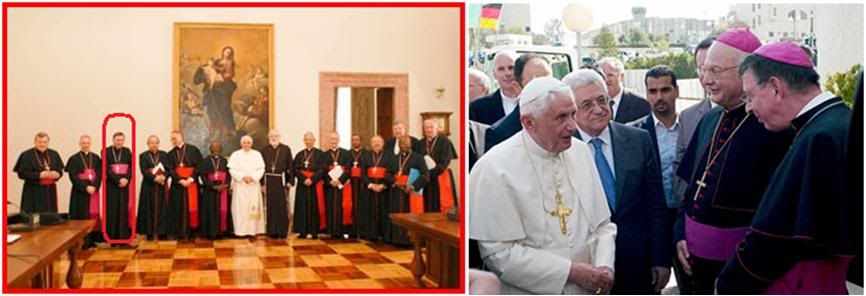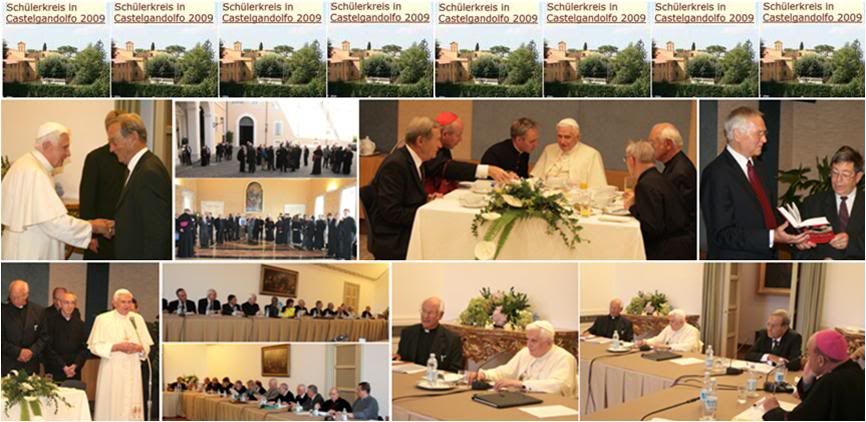

 Mons. Koch to lecture to
Mons. Koch to lecture to
the 2010 Schuelerkreis seminar
Translated from

July 9, 2010
Everything is ready at Castel Gandolfo for the 2010 annual reunion and seminar for Benedict XVI and his Ratzinger Schuelerkreis on August 27-29 (Friday to Sunday). In fact, there will be new attendees this year in the person of young theologians who have been studying the theology of Joseph Ratzinger.
[Actually, these new-generation theologians were first invited to the Schuelerkreis summer seminar in 2008, according to the Schuelerkreis annals which also includes photos of their attendance in 2008 and 2009]
After dedicating the annual seminar to Islam, creation and evolution, and Church mission in recent years, the topic this year is 'The hermeneutic of Vatican II'. Namely, the great debate in the post-Conciliar decades on whether the Council represented a rupture in the history of the Church rather than a renewal in continuity
[as its great convoker, Blessed John XXIII, himself made clear he expected it to be, in his address opening the Council].
The Pope will attend all of Day 1 of the seminar with his former students and the young theologians, and will be listening to two lectures by Mons. Kurt Koch, the new President of the Pontifical Council for Promoting Christian Unity.
An interesting and demanding initial assignment for the Swiss prelate, who was Bishop of Basel and president of the Swiss bishops conference since 2006.
Koch studied theology in Lucerne and Munich
[the same university where Joseph Ratzinger earned his doctorate in theology twenty years earlier], and in 1989, he was given the chair of Dogmatics and Liturgy in Lucerne's faculty of theology, later becoming dean of the faculty, and eventually rector.
He was named Bishop of Basel in 1995 by John Paul II and was a member of the Swiss bishops' ecumenical commission. He was vice president of the Swiss bishops' conference for nine years before becoming president in 2006.
Since 2002, he has been a member of the Pontifical Council he now heads, with concurrent membership in its ancillary, the Vatican Commission for Religious Relations with Judaism.
 The only two pictures I have found online so far showing Mons. Koch with Benedict XVI: Left, at the Pope's consultation meeting with selected bishops before publishing Summorum Pontificum' photo from Cardinal O'Malley's blog; and right photo, during the Holy Father's trip to the Holy Land last year (Mons. Koch is at extreme right).
[Additional info from Wikipedia (all the facts cited here are supported by appropriate references):
The only two pictures I have found online so far showing Mons. Koch with Benedict XVI: Left, at the Pope's consultation meeting with selected bishops before publishing Summorum Pontificum' photo from Cardinal O'Malley's blog; and right photo, during the Holy Father's trip to the Holy Land last year (Mons. Koch is at extreme right).
[Additional info from Wikipedia (all the facts cited here are supported by appropriate references):
When a group of Swiss intellectuals and theologians called for John Paul's resignation on 20 May 2004, Koch described the act as "disgusting and disloyal" especially since it was done on the Pope's 84th birthday. In 2006, he voiced his disagreement with opposition to building Muslim minarets in Switzerland (a ban supported by the Swiss in a 2009 referendum), but also asked for greater religious freedom for Christians in Muslim countries.
In June 2007, he was among the selected group of bishops from around the world invited to the Vatican to meet with Benedict XVI before he published his motu proprio Summorum Pontificum. (What Wikipedia does not mention is that subsequently, Koch wrote an eight-page pastoral letter to refute actual and potential objections to SP.)
He also defended the clarification by the Congregation for the Doctrine of the Faith regarding the expression "subsistit in" used in Lumen Gentium, while acknowledging that the document could appear confusing or hurtful to Protestants and ecumenical Catholics. He pointed out that that document and its diverse reception showed the differences between the ecumenical goals of Catholics and the Orthodox and that of Protestants.]
Like his predecessor at Christian Unity, Cardinal Walter Kasper, Koch is a theologian who has lived all his life in an environment where Catholics are in the minority compared to Lutherans adn members of the other 'reformed Churches'.
Prof. Stephan Horn, who has organized the Schuelerkreis annual meetings for some time, says that the choice of the annual seminar theme is always made with the approval of their former teacher.
Il Foglio carried a Page 1 story earlier this week about the Schuelerkreis seminar:
In the classroom with B16:
This year, to discuss
'The hermeneutic of Vatican II'
Translated from

July 6, 2010
The more sophisticated among Vatican watchers say that to truly know Joseph Ratzinger, one must listen to his former students, the so-called Ratzinger Schuelerkreis, who have been attending an annual seminar reunion with him since 1977.
With his ex-students, the Pontiff feels 'rather like the young Jesus among the doctors in the Temple', said Fr. Martin Trimpe to Gianni Valente, who wrote the book
Ratzinger Professore published in 2008. Trimpe was a student of Prof. Ratzinger in Tuebingen and Regensburg.
He says that when he attends the seminar sessions, the Pope "nibbles at his pencil, moves his legs restlessly under the table, and seems inflamed with the the same passion and curiosity he had as a young seminarian in Freising".
A passion, he says, that is clearly joyful: "He loves being with his former students because he experiences a sort of theological joy!"
So it was for years. And so it has continued to be even when Prof. Ratzinger became Pope Benedict XVI. It was no secret that he had long looked forward to retiring from his long service at the Congregation for the Doctrine of the Faith, expecting to retire to Bavaria, away from the din of Rome and the intricacies of the Curia, to resume the life of a scholar.
But "after the great John Paul II, the cardinals have elected me, a simple and humble worker in the vineyard of the Lord", he said to the world shortly after he was chosen Pope in April 200.
Which meant an 'adjustment' but not an abandonment of his dream. By all accounts, Benedict XVI makes time daily to catch up on his reading and to write. Especially so in summer, when he has more time at his disposal.
Even the choice of seminar topics reveals the 'private' Ratzinger. In the first Schuelerkreis seminar held after his election, the topic was the concept of God in Islam.
[This was September 2005, a full year before he would deliver the seminal Regensburg lecture!]
Shortly afterwards, one of the attendees, Jesuit Fr. Joseph Fessio
[president of Ignatius Press, which publishes most of the Ratzinger/Benedict XVI books in the USA], disclosed in an interview what the Pope had said about Islam. There was a minor controversy that prefigured the grand furor over the Regensburg lecture the following year.
In 2006 and 2007, the topic was 'Creation and Evolution', after which, for the first time in 30 years, the Schuelerkreis published the documents of the seminar in book form.
In 2008, it was about Jesus and the Gospels, almost like a re-examination of what he wrote in JESUS OF NAZARETH, with the input of ranking German Biblical scholars, including non-Catholic ones.
Last year, it was about the mission of the Church. Which was perhaps an appropriate prelude to this year's discussion on "The hermeneutic of Vatican II', which has been substantially the leitmotif of Joseph Ratzinger'e entire theological career since he took part in the Council as an official theological consultant.
The topic also reopens the question - Is Joseph Ratzinger an advocate of the reforms proposed by the Council or is he the 'castigator' of all the misinterpretations and abuses that followed the Council?
[But the two functions are complementary, not mutually exclusive, and he is both!]
During the council, Prof. Ratzinger was definitely on the side of the reform-minded wing. But as he later told Vittorio Messori, "It was not I who changed, but they"
[referring to his former colleagues like Hans Kueng et al who believe that Vatican II gave birth to a new Church, and who accused him of 'turning conservative'].
As if to say that true reform in the Church, as intended by Vatican II, does not consist of the questionable changes set in motion by his former colleagues, not changes which cut off all links to the past and open the Church unconditionally to secularism!
Benedict XVI sees the reform of Vatican II as renewal of the Church in continuity with its Tradition.
At Castel Gandolfo this summer, two representatives of Central European theology
[the school of thought most closely identified with the progressivist interpretation of Vatican II] will be present: Kurt Koch, the Pope's new 'minister for ecumenism', and Christoph Schoenborn, the headline-making Archbishop of Vienna.
Photos of the 2009 Castel Gandolfo seminar
from the website of the Joseph Ratzinger-Benedikt XVI Stiftung:
 NB: The English service of ZENIT posted a story today, July 9, about the Pope's vacation in Castel Gandolfo. It is almost a straight verbatim translation of Marco Ansaldo's story in Repubblica on 7/7 [a story I translated the same day on this thread, in the preceding page] without any acknowledgment at all to Ansaldo or Repubblica. That's an appalling professional No-No I did not expect to see in ZENIT, which is the news agency of the Legionaries of Christ, and is usually properly professional (other than choosing not to report earlier on the LC's problems, until after the visitation].
NB: The English service of ZENIT posted a story today, July 9, about the Pope's vacation in Castel Gandolfo. It is almost a straight verbatim translation of Marco Ansaldo's story in Repubblica on 7/7 [a story I translated the same day on this thread, in the preceding page] without any acknowledgment at all to Ansaldo or Repubblica. That's an appalling professional No-No I did not expect to see in ZENIT, which is the news agency of the Legionaries of Christ, and is usually properly professional (other than choosing not to report earlier on the LC's problems, until after the visitation].
[Modificato da TERESA BENEDETTA 11/07/2010 22:06]